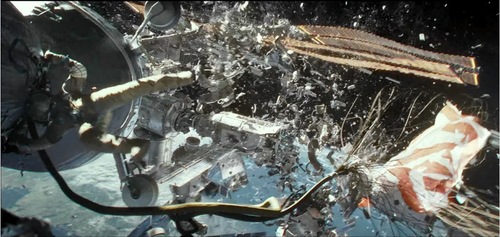When do you hear?
 An astronaut in outer space sees a meteor collide with a satellite 27,000,000 meters away, resulting in a spectacular explosion. If the speed of sound in air is 300 meters per second, how long will it take for the astronaut to be able to hear the explosion?
An astronaut in outer space sees a meteor collide with a satellite 27,000,000 meters away, resulting in a spectacular explosion. If the speed of sound in air is 300 meters per second, how long will it take for the astronaut to be able to hear the explosion?
This section requires Javascript.
You are seeing this because something didn't load right. We suggest you, (a) try
refreshing the page, (b) enabling javascript if it is disabled on your browser and,
finally, (c)
loading the
non-javascript version of this page
. We're sorry about the hassle.
5 solutions
The problem with this solution is space is not a perfect vacuum. Yes in a vacuum sound would not be able to travel due to there being nothing to propagate the wave in, but there are things capable of propagating sound waves in space. http://science.nasa.gov/science-news/science-at-nasa/2003/09sep_blackholesounds/ An example of such is shown in this NASA article of a black hole sending a sound wave across several light years. To accurately provide an answer to this question, it needs more context that is not given. For instance the nature of the explosion being "spectacular" does not communicate what frequency/wavelength of sound wave will be produced. "You are an astronaut out in space." Does not communicate whether or not there is a sufficient enough medium to generate a sound wave at a specific frequency/wavelength. To summarize, the rationale in your answer is based off of assumptions you make about the question, in which there is nothing in the question to support those assumptions, rendering your rationale flawed. This question is insufficient leaving indefinite answers.
If sound can not travel in vacuum,then how can you tell the speed of sound in vacuum.Did you done any experiment to calculate the speed of sound in vacuum!!!
Log in to reply
Sound can have a speed, it is possible but it needs a medium for the propagation of sound which is not in the space.
Log in to reply
Then why did you give the speed of sound is 300m/s.Speed of sound in vacuum is 0m/s
Log in to reply
@Vishal S – You're given that the speed of sound in air is 300m/s, the problem says nothing about the speed of sound in a vacuum.
@Vishal S – actuall in the question he specified IN AIR
So why does Voyager 2 carry music on board, as mentioned in a book, so that aliens can recognize it??
Log in to reply
Hey my friend, if you are talking about that Voyager 2 which has left a time capsule in space with images and sounds which portray the earth's life and culture then let me tell you that it is a 12-inch gold-plated copper disk containing sounds and images. And if you tend to hear it you would need a medium ultimately for propagation of sound.
Log in to reply
But still it's stupidity to leave a time capsule in space where probably no one will hear it.
Log in to reply
@Vaibhav Kandwal – It has been left there so that if there is or will be life in anywhere in this universe then those can access the information of our life and the activities we did .
Log in to reply
@Rishabh Kumar – What if they are not as advanced as we are??
Log in to reply
@Vaibhav Kandwal – You know we were also not so advanced earlier but now we are so may be this will happen with them also.
No medium for sound to travel in space therefore you won't hear the explosion
sound uses air to travel = sound on earth
صوت از جمله امواج میخانیکی است که بدون محیط منتشر نمیشود لذا درفضا قادر به شنیدن آن نخواهیم بود
Sound can not travel through vaccum, so you will never be able to hear that sound.